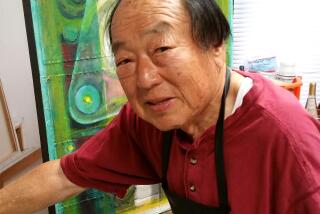Haru Reischauer; Bridged Japanese, U.S. Cultures
- Share via
Haru Matsukata Reischauer, who was called a bridge between America and her native Japan when the two nations were deeply divided, died of heart failure recently in La Jolla. She was 83.
Reischauer’s life was the subject of a 1994 biography on public television’s “American Playhouse.”
She was raised in Japan and studied in the United States, where she met Harvard University professor Edwin Reischauer through author James Michener. In 1961, President John F. Kennedy appointed Edwin Reischauer ambassador to Japan. At the time, the Japanese government was under pressure to end the security arrangement that placed U.S. servicemen in Japan.
The ambassador often turned to his wife for advice because of her understanding of U.S. and Japanese cultures. She was soon considered Japan’s most popular woman after the empress.
“She, herself, was a bridge,” said George R. Packard, president of the U.S.-Japan Foundation in New York. “She represented an America that was friendly and respectful to Japan.”
But roaming between two cultures sometimes baffled Reischauer. In her biography, “Long Shadows,” she confessed to being stymied by simple things like introductions. “Do I bow,” she asked, “or shake hands?”
The confusion didn’t stop her. “She broke down many barriers,” said Ricki Franklin, who fought to tell Reischauer’s story on PBS.
She died Sept. 23, eight years after her husband. She is survived by a stepson, Robert Reischauer of Bethesda, Md.; two stepdaughters, Ann Heinemann of La Jolla and Joan Simon of Larchmont, N.Y.; two sisters; nine grandchildren, and three great-grandchildren.
More to Read
Sign up for Essential California
The most important California stories and recommendations in your inbox every morning.
You may occasionally receive promotional content from the Los Angeles Times.













